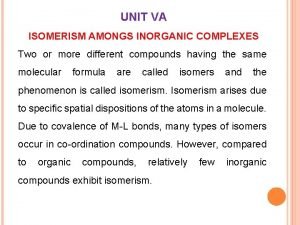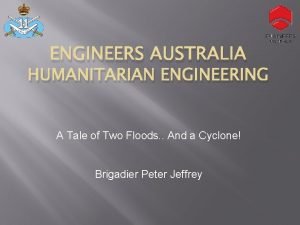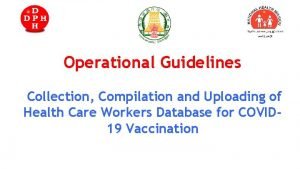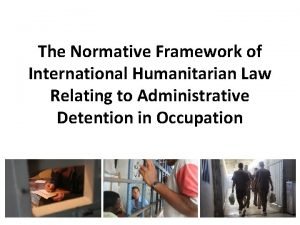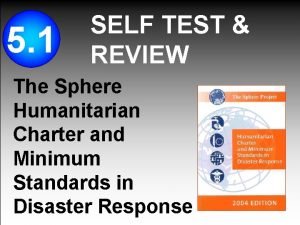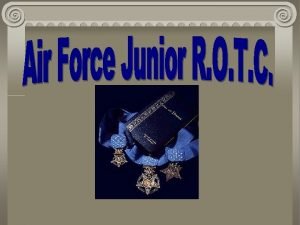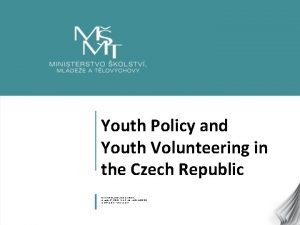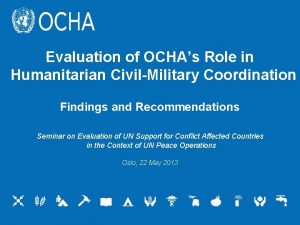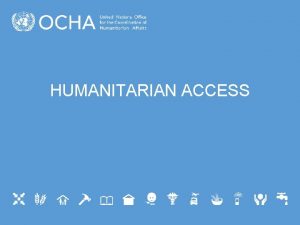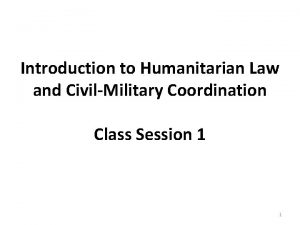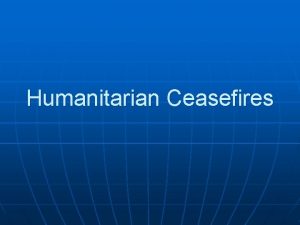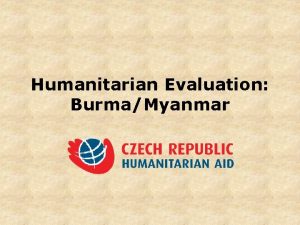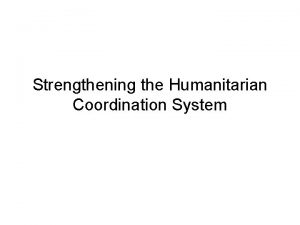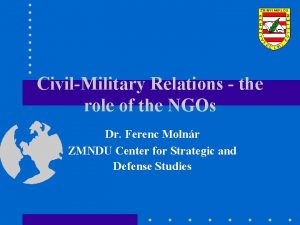Evaluation of OCHAs Role in Humanitarian CivilMilitary Coordination











- Slides: 11

Evaluation of OCHA’s Role in Humanitarian Civil-Military Coordination Findings and Recommendations Seminar on Evaluation of UN Support for Conflict Affected Countries in the Context of UN Peace Operations Oslo, 22 May 2013

Independent Evaluation of OCHA’s Role in Humanitarian Civil-Military Coordination

Objectives of the Evaluation • To evaluate OCHA’s role in humanitarian civil-military coordination, focusing on its relevance, effectiveness, and efficiency • To collect good practices in the implementation of the function • To provide recommendations at both the strategic and operational level

Methodology Mixed-method approach drawing upon: • Extensive review of documents • Three distinct surveys, of o OCHA Head of Office and designated UN-CMCoord officers o IASC Task Force on Humanitarian Space and Civil Military Relations o Cluster Leads from Global Cluster Groups • Field missions to Afghanistan, Haiti, Colombia, South Sudan, and Somalia, as well as to two Regional offices, in Kenya and Thailand • Desk reviews of Pakistan and Libya • Overall, 230 interviews with key informants

Key Findings #1 • • • Overall conclusions are relatively positive despite it being hard to please all the stakeholders involved in civil-military coordination OCHA has made good efforts to professionalize civil-military coordination and make it a focus, establishing normative texts, creating the CMCoord function, and increasing the field orientation In past, OCHA seen as less than committed to civil-military coordination, now seen as more committed especially due to good work of CMCS section despite resourcing and corporate issues OCHA does face challenges from such things as militaries wanting to go it alone and limited resources on the ground Yet despite the challenges, virtually all parties from all sides of the spectrum feel that OCHA is better placed than any other organization to assume the humanitarian civil-military coordination job

Key Findings #2 There is room for OCHA to improve however: • Concerns about impartiality and neutrality • Internal factors hinder OCHA: o insufficient mainstreaming of the UN-CMCoord function o general lack of systematization especially at the field level o human resource constraints o training challenges o poor use of lessons learned • The monitoring and evaluation of the UN-CMCoord function remains ad hoc. Data collection, reporting, conducting reviews, and collating results into best practices and lessons learned are not systematic. • OCHA has given insufficient attention or thinking to UN-CMCoord challenges in Integrated Mission contexts • …. the training has not yet reached sufficient numbers of other relevant groups – such as Cluster Leads, OCHA staff in the field, Humanitarian Coordinators, and NGOs.

Recommendations - High 1: OCHA should fully implement the policy instruction and should allocate sufficient resources to ensure that UN-CMCoord becomes a core competency within OCHA. 2: OCHA, as a key agency for UN-CMCoord policy guidance under the IASC, should improve support and assistance to the humanitarian community in their interactions with national militaries in various scenarios. 3: The mainstreaming of UN-CMCoord within OCHA called for by the policy instruction should be continued through the existing mechanisms (advocacy, training and awareness), in order to enhance the profile of the function within the organization and respond to accountability gaps. 4: OCHA regional offices should develop clear strategies for advancing UNCMCoord in their regions, and should have UN-CMCoord personnel trained and competent to provide surge support in country offices where required. 5: OCHA should mandate that UN-CMCoord country-specific guidelines and standard operating procedures be developed in emergencies in which military actors are engaged. Where possible, these should be part of OCHA’s overall contingency/preparedness stage of planning in priority natural-disaster prone countries.

Recommendations – Medium #1 6: In line with the IASC transformative agenda, it is strongly suggested that OCHA move forward on implementing its improved knowledge management structure in order to share lessons learned and disseminate best practices; it should also systematize its M&E function such that it can recognize successes, identify best practices and increase the accountability of the function to the rest of the organization 7: OCHA should engage more systematically with DPKO in developing best practices and lessons learned related to ensuring neutrality and impartiality in countries with integrated peacekeeping missions, so as to facilitate decision making, communication, and leadership. 8: OCHA should further develop and enhance strategic relationships and partnerships as well as synergies with regional organizations, and should use senior political level engagement to raise the profile of such partnerships. 9: OCHA should, at the first opportunity, conduct an in-depth assessment of the education, awareness building, and capacity development needs of its multiple external stakeholders in civil-military coordination, and should design creative policies and approaches to meet them.

Recommendations – Medium #2 10: OCHA should seek innovative ways to expand knowledge of UN-CMCoord such as through the use of computer assisted training modules and engaging with military-academic institutions. 11: OCHA should improve access to and the reach of UN-CMCoord training, making a particular effort to focus upon NGO participants and participants in developing countries, Humanitarian Coordinators, OCHA staff in complex emergency settings, and national emergency coordination agencies and national military forces. 12: OCHA and the IASC should place an increased emphasis on pre-deployment planning and training with appropriate actors.

Recommendations - Low 13: OCHA should develop short, reader-friendly basic UN-CMCoord materials to increase their relevance and accessibility. 14: OCHA should optimize the UN-CMCoord function with its current staffing of country offices, regional offices and in CMCS, so that it is drawing on the resources it has and thus avoids any gaps in meeting UN-CMCoord staffing needs in high-demand countries.

 Optical isomers bidentate ligands
Optical isomers bidentate ligands Wcag
Wcag Humanitarian engineers in cape york
Humanitarian engineers in cape york Ee.humanitarian response.info/x/vpdlixjf
Ee.humanitarian response.info/x/vpdlixjf Khalifa humanitarian foundation
Khalifa humanitarian foundation Humanitarian programme cycle 2021
Humanitarian programme cycle 2021 International humanitarian law icrc
International humanitarian law icrc Humanitarian work psychology
Humanitarian work psychology Sphere book humanitarian
Sphere book humanitarian Longevity ribbon jrotc
Longevity ribbon jrotc International humanitarian law icrc
International humanitarian law icrc Humanitarian projects in prague for youth
Humanitarian projects in prague for youth
